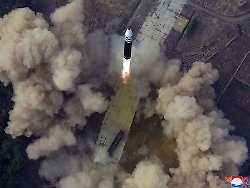Tough sanctions on North Korea
Kim raves about monster rocket test
03/25/2022, 07:40 am
In the shadow of the Ukraine war, North Korea is provoking the largest missile test since 2017. This immediately results in tough sanctions. While the isolated country praises the test, Japan feels particularly threatened – the missile is said to have landed in its territorial waters.
The West has strongly condemned North Korea’s ICBM test and increased diplomatic pressure on the isolated country. The United States announced on Thursday new sanctions against facilities that are said to have procured “sensitive elements for the North Korean missile program” – including two Russian companies. The UN Security Council is now to discuss North Korea’s largest missile test since 2017.
According to state media, North Korea’s head of state Kim Jong Un personally oversaw the test launch of a new type of ICBM on Thursday morning. Kim said the new Hwasong-17 weapon will “fulfill its mission and duty as a powerful nuclear deterrent,” according to KCNA. The system is dubbed the “Monster Missile” by experts. The ruler went on to say that his country now has “impressive military and technical capabilities unfazed by any military threat and blackmail” and is “fully prepared for a long-term confrontation with the US imperialists”.
The US then announced sanctions against several North Korean and Russian facilities. These meet the Office of Foreign Affairs of the Second Academy of Natural Sciences of North Korea and a citizen directly. This is intended to hamper efforts to “advance their missile program,” the US State Department said. The sanctions also affect two Russian companies named Ardis Group and PFK Profpodshipnik, and a Russian named Igor Alexandrovich Mishurin. This underscores “the pernicious role” that Russia is playing “on the world stage” by “supporting” North Korea’s nuclear program. The United States did not say exactly what this support looked like.
The UN Security Council will discuss the missile test this Friday. The meeting is scheduled to begin at 3 p.m. New York time (8 p.m. CET). “The launch of a long-range missile carries the risk of escalating significant tensions in the region,” UN spokesman Stephane Dujarric said. He warned North Korea “not to take any further counterproductive actions”.
Rocket hits Korean East Sea
According to North Korea, the missile was launched at Pyongyang International Airport. Within a good hour, she flew more than 6,000 kilometers high and 1,090 kilometers far, “before she hit exactly the previously defined area in the waters of the East Korean Sea,” as KCNA announced. According to the Japanese government, the ICBM landed in Japanese territorial waters with a range of more than 6,200 kilometers. Tokyo spoke of an “unforgivable test”. Defense Minister Nobuo Kishi said it was a serious threat with a different dimension than before. South Korea, the USA and Germany also reacted with outrage.
The North Korean military conducted several tests with a Hwasong-15 ICBM in 2017. As a result, North Korea, which is internationally isolated because of its nuclear weapons program, refrained from further tests. Since January, the leadership in Pyongyang had hinted that it could lift the self-imposed moratorium on such tests.
North Korea has long sought an ICBM capable of carrying multiple nuclear warheads. According to Seoul and Washington, the country recently tested the Hwasong-17 under the pretext of launching a “reconnaissance satellite”. Last week, a probable test of the Hwasong-17 ended in failure when it exploded over the capital shortly after takeoff. KCNA said Thursday’s successful launch “conclusively demonstrated that all parameters of the weapon system accurately meet design requirements.” “Prompt operation” can now also be guaranteed “under wartime conditions”.
